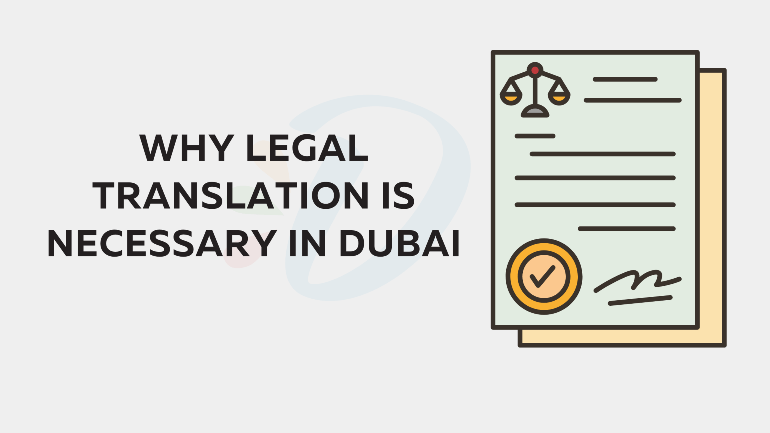Why is legal translation necessary? Legal translation is crucial in our globalised world. It involves accurately converting legal documents from one language to another without losing the legal meaning. In this blog post, we’ll discuss the importance of legal translation in different fields.
Table of Contents

Preserving Legal Systems through the Art of Legal Translation
The role of legal translation in preserving legal systems is of utmost importance as it facilitates communication and comprehension among legal practitioners from different countries and cultures.
legal translation in Dubai entails transmuting legal texts from one language to another while maintaining the original text’s essence, context, and legal implications.
Legal systems are intricate and often exhibit significant differences from country to country.
Legal terminology, concepts, and principles can vary widely, thus presenting a challenge to legal practitioners when communicating effectively across different legal systems.
Legal translation bridges this gap by ensuring that legal texts are translated with precision, thus facilitating legal communication and promoting the standardisation of legal systems.
Cross-border litigation – Why is Legal Translation Necessary?
Legal translation is indispensable in cross-border litigation as it guarantees that all parties can precisely comprehend and interpret legal documents and proceedings.
The absence of appropriate legal translation can result in misunderstandings and misinterpretations, leading to legal disputes and delays in the litigation process.
In cross-border litigation, legal translation is essential for various documents, including:
- Pleadings.
- Contracts.
- Legal opinions.
- Court rulings.
These documents must be translated meticulously to preserve the original text’s legal context and meaning.
The accuracy of legal translation in Dubai is crucial as legal terminology and concepts may differ among languages and legal systems, and any mistranslation may result in severe consequences. Why is Legal Translation Necessary
Furthermore, legal translation must be done by professionals with expertise in both the source and target languages and a comprehensive understanding of the legal systems involved.
They should thoroughly comprehend both languages’ legal terminology, concepts, and procedures to ensure the translation is precise and culturally appropriate.
The Significance of Legal translation office Dubai in Global Business Dealings
International business deals usually involve parties from different countries, each with other legal systems and languages.
Legal translators must comprehensively comprehend the legal terminologies and the languages involved in the transaction.
They must be able to precisely translate legal documents, such as contracts, agreements, patents, and other legal materials, while also considering any cultural intricacies that may influence the interpretation of the text.

Moreover, apart from translating legal documents, legal translators also perform a critical function in guaranteeing that all parties know any legal requirements or regulations that may apply to the transaction.
They may need to furnish guidance on local laws, regulations, and customs to ensure that the transaction complies with all applicable legal requirements.
Legal translation in patent and trademark law
Legal translation is paramount in patent and trademark law, as it facilitates precise communication of legal concepts and terminology across diverse languages and legal frameworks.
Ensuring precision in translating patent applications and trademarks is imperative, as this helps safeguard intellectual property rights in multiple jurisdictions.
Any erroneous translations could potentially lead to disputes and even invalidate patents.
Moreover, legal translation is instrumental in cross-border litigation, fostering a sense of equity and preserving the rule of law.
Accurate translations are essential in safeguarding intellectual property, mitigating misunderstandings, and guaranteeing fairness in legal proceedings.
The Vital Role of Legal Translation in Upholding Human Rights Law
Legal translation within the context of human rights law is a complex and indispensable task that necessitates a profound comprehension of both legal and linguistic concepts. Why is Legal Translation Necessary
Human rights law protects and advocates fundamental human rights and freedoms.
It entails many legal instruments, such as treaties and regulations, safeguarding human dignity, equality, and non-discrimination.
translation office Dubai must consider cultural and linguistic nuances to ensure the translated text is precise regarding legal concepts, terminology, and style.
The ramifications of minor errors or misinterpretations can be substantial. Hence legal translators must be aware of the diverse legal systems and traditions that underpin human rights law, along with its cultural and historical context.
Legal Translation: Key to Immigration Law
Legal translation is of utmost importance in the context of immigration law, as it is imperative that all parties involved fully comprehend their rights and obligations.
The precision and accuracy of legal documents, such as passports, birth certificates, marriage certificates, and diplomas, must be maintained to ensure that immigration officials can fully comprehend their contents. Why is Legal Translation Necessary
The need for accurate translation extends to applications for citizenship or asylum, where the correct processing of such documents relies heavily on precise translation.
Furthermore, when dealing with complex immigration laws and procedures, interpreting laws, regulations, and policies in different languages becomes crucial to avoid misunderstandings.
Avoiding such misunderstandings by providing accurate legal translation in immigration law is paramount to preventing severe legal consequences for immigration applicants.
EU Law and Legal Translation: A Vital Partnership
Legal translation is paramount for the European Union (EU) due to its membership of 27 states with distinct official languages.
The EU employs 24 official languages, and regulations are drawn up in multiple languages, necessitating accurate translations for uniform comprehension by all member states.
This guarantees the accessibility and understanding of EU law for all citizens and businesses.
Legal translation is also crucial for cross-border legal proceedings, ensuring precise translations of legal documents and court proceedings that are imperative for maintaining impartiality in trials and upholding the principles of justice. Why is Legal Translation Necessary
Furthermore, it is indispensable for effectively operating the EU’s internal market, facilitating the free movement of goods, services, and people across borders.
The EU has a comprehensive legal translation system comprising a team of translators and editors in its Translation Centre (CDT) and a legal framework that regulates the translation of legal documents and the deployment of translators in legal proceedings.
Safeguarding Intellectual Property through Legal Translation
Legal translation is paramount in preserving intellectual property (IP) beyond borders.
IP encompasses inventions, literary and artistic works, designs, and symbols sheltered by patents, trademarks, copyrights, and trade secrets.
Legal translation is indispensable because IP laws and regulations vary across countries.
Precise translation of legal documents associated with IP guarantees their proper comprehension and implementation in diverse jurisdictions.
For instance, enterprises expanding to foreign governments must defend their IP by accurately translating legal documents such as patent applications, licensing agreements, and trademark registrations.
The inaccurate translation may result in excessive errors, including loss of rights, damages, and reputation in IP-related legal disputes.
The Crucial Role of Legal Translation in International Arbitration
Legal translation is of utmost importance in international arbitration, as it facilitates equitable access to information for all involved parties.
Precise translation of legal documentation and evidence enables the parties to comprehend the legal ramifications and make informed decisions, especially during the evidentiary phase, where misinterpretations could impede their ability to present the case on a level playing field.
Any fallacies or imprecisions in legal translation could give rise to misunderstandings and an unjust verdict.
Therefore, competent and seasoned legal translators who possess familiarity with the legal systems and terminologies utilised in the arbitration are essential in ensuring impeccable legal translation.






Leave a Comment